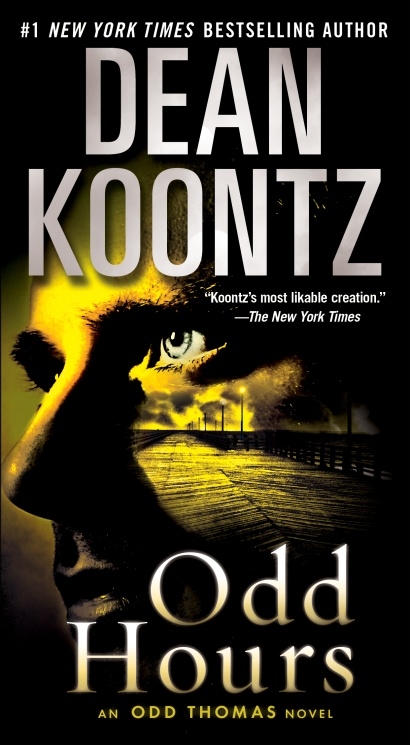 Some bad books are like buildings, collapsing safely in their own footprint. Cordon off the area, wear protective gear, and you’ll escape the obliteration unscathed.
Some bad books are like buildings, collapsing safely in their own footprint. Cordon off the area, wear protective gear, and you’ll escape the obliteration unscathed.
But other bad books are like trees, falling sideways. They don’t just doom themselves, they also destroy other books that happen to be nearby.
Dean Koontz writes many bad books. If they’re standalone, I don’t have a problem, as they kill nothing but themselves. But this is the fourth book in the Odd Thomas series, and as the first Odd Thomas was very good I’m not impressed that he keeps cheapening it with afterthoughts.
The story is familiar by now. Odd can see ghosts, and he must resolve the lingering conflict that keeps them from moving on. The concept is derivative of Shyamalan’s The Sixth Sense, Stephen King’s generic “big secret in a small town” conceit, and Art Bell’s radio broadcasts, but back then, it was fun. It no longer is. If Odd Thomas was The Godfather and Forever Odd was the Godfather 3, then Odd Hours is squarely in The Godfather X: Electric Boogaloo territory. It has a terrible, meandering story, a cast of “colorful” characters with no purpose beyond chewing the scenery, and a bone-deep sense of pointlessness. Odd Thomas should resolve the lingering conflict that stops his own series from moving on. I think the author murdered it, midway through book two.
Odd now lives at a place with the alarming title of Magic Beach. He has dreams of a nuclear-red storm coming in with the tide. Some thugs try to kill him. He meets a woman who gets lots of character development until Dean Koontz literally seems to forget that she’s in the story.
Is there an intelligent dog? You bet. Does the main character use a gun and is consumed with guilt and regret afterwards? Wow, you’ve read Dean Koontz before too!
The plot is insane and nonsensical. It doesn’t have logic, it has a series of events, all occurring without reference to one another.
The sheriff of Magic Beach is plotting a dastardly conspiracy – I don’t buy that a guy running a small-town cop shop would be capable of buying nuclear warheads, but your mileage may vary – and Odd Hours soon enters a familiar rhythm of the hero running away from bad guys and solving problems with author’s convenience. In this case, it doesn’t take too much convenience, because the (six or seven) villains are all bumbling idiots who could be thwarted by a childproof seal. Dean Koontz can’t figure out how to resolve the story, so he has them all shoot each other. Then the book ends.
Dean Koontz is still a good prose stylist, but he’s a heavy-handed good prose stylist. Every sentence aspires to be a lyrical utterance of lapidary beauty. Every page is crammed with wordplay, literary allusions, “clever” character names, and other pukesome shit. Dean, stop trying so hard. No, seriously, stop trying so hard. You are fish and chips. I don’t need fish and chips served on a fine Kensington tea set.
He also does that annoying thing where he writes something clever and then nudges you, to make sure you got it. Early in the book, a character is described as having “hair like wool-of-bat and tongue like fillet of fenny snake”. I’d hoped he’d leave it alone, but of course he has someone point out (for the reader’s benefit) that this is a Shakespeare reference. Thanks. Literary allusions should always be bashed through the reader’s skull with a Louisville slugger.
Koontz’s recycling is now obvious, and impossible to ignore. All the cliches make an appearance. The frequent references to classic Hollywood cinema. The angry old man rants about popular culture and modern music (you can immediately detect a bad egg in Dean Koontz’s novels, because they enjoy gangsta rap or heavy metal). At one point, he writes the character of Dick Halloran from The Shining into the story, except instead of a black man it’s a white woman and instead of “the shine” it’s “the twinge”. I hoped that he’d also borrow the axe murder scene from Kubrick’s film version, but no luck.
No Comments »
 [You have a problem.]
[You have a problem.]
[You google the problem.]
[The only relevant result is a forum thread from 2011.]
OP: [exact description of the problem you are having]
Person 1: [wrong answer]
Person 2: [wrong answer]
Person 3: [correct answer to a problem that is not this one]
Person 4: [“solution” that involves twenty hours of work, broken laws, $2000, and a fresh human kidney]
Person 5: [“solution” that amounts to “have you considered not doing the thing you’re trying to do?]
Person 6: [pointless chiming in that they don’t have that problem and therefore cannot help you]
Person 7: lol! Person 2 has a Better Call Saul avatar! Does anyone watch Better Call Saul?!? Let’s talk about Better Call Saul right here in this thread!
Person 8: [correction of spelling mistake that itself contains multiple spelling mistakes]
Person 9: [wrong answer, stated with utter confidence. Post contains the words “this WILL work” and ends with an unprompted “you’re welcome! :)” because clearly the problem is as good as fixed. Reacts with bafflement and hostility when their solution doesn’t work.]
Person 10: I have the same problem! [proceeds to describe a problem that, although superficially similar, is in fact wildly different to the one in the OP. Everyone rallies around Person 10 and starts trying to fix his totally different problem.]
Peanut gallery: [steady stream of inside jokes, innuendo, and resurrections of old catfights that nobody but they themselves understand.]
Person 11: Hey, OP, this should help [posts a link]
OP: Thanks Person 11, you fixed my problem! Wow, that was a real head-scratcher! I would NEVER have thought of that on my own!
Moderator: issue resolved. Thread locked.
[You click the link. The website went offline a long time ago, and the domain redirects to a Russian goat porn site. No backups exist on the Internet Archive.]
[You start your own thread asking for help]
Everyone: jeez, learn to search the forum! We already resolved this issue!
No Comments »
 In 1660, an English functionary called Samuel Pepys began keeping a diary. This diary would eventually run for a million words, covering ten years of his life (and England’s history). He documents some of the most important events in history, along with things like his masturbation in church, his affairs with a variety of household maids, and the first performance of Romeo and Juliet (“it is a play of itself the worst that ever I heard in my life”). The diary has no longer just describes history, it has become history. It’s like the Great Pyramid: built to memorialize a great man and great times, and now great for its own sake. People will know of the Great Pyramid long after they have forgotten Khnum-Khufu.
In 1660, an English functionary called Samuel Pepys began keeping a diary. This diary would eventually run for a million words, covering ten years of his life (and England’s history). He documents some of the most important events in history, along with things like his masturbation in church, his affairs with a variety of household maids, and the first performance of Romeo and Juliet (“it is a play of itself the worst that ever I heard in my life”). The diary has no longer just describes history, it has become history. It’s like the Great Pyramid: built to memorialize a great man and great times, and now great for its own sake. People will know of the Great Pyramid long after they have forgotten Khnum-Khufu.
A lot of the diary is spent documenting minutia of Pepys’s day to day life. The diary begins not long after the death of Oliver Cromwell, and the rearrangement of the state has landed Pepys with a new job (he notes at one point that when England suffers, he prospers). Soon we learn more about his personal life, which includes plays, wine, and endless marital strife (Elisabeth Pepys was often unhappy with him. Given his habit of seducing their housemaids, one feels empathy). Some of this is eternally fascinating, and some would have been mundane at the time but now provides a valuable glimpse of how an upper class Englishman lived his life in the days of the Rump.
Almost everything we know about the past is drawn from a stacked deck – conquerors writing of their greatest battles, artists painting their subjects in the full flower of youth and health. Time has an editorial process that winnows out mundane events, but you need the mundanity. A historical document without trivia is like an English sentence without conjunctions or articles – informative, but jarring, and you spend a lot of effort reconstructing the missing words. Pepys’s diary, even in its most boring pages, provides one of the clearest windows we have into Renaissance England. Most of the others are made of stained glass.
The diary’s most harrowing pages are the eyewitness descriptions of the Great Fire. Pepys’s prose is evocative and almost Blakean (“the poor pigeons, I perceive, were loth to leave their houses, but hovered about the windows and balconys till they were, some of them burned, their wings, and fell down”), which is appropriate, because the fire was apocalyptic, a bowl of wrath spilled before the appointed time. And it was very typical of Pepys to notice the poor pigeons. Earlier parts of the diary are hard to read (particularly Pepys describing his careful renovations of his home) because you know what will happen soon.
But the diary leaves mysteries as well as answers. For example, was this really a window into Pepys’s private, unfiltered thoughts? Or did he intend for it to be read by the public?
We don’t really know. The diary was written in a nearly impenetrable shorthand, and was deciphered in the 19th century by a St John’s College undergraduate (he would later learn that his effort was needless, and the key to the cipher was in the college’s very library). Modern editions of the diary are very clean and readable, once the reader trains his brain out of imposing anachronisms on the text (“sack” means wine, and when Pepys refers to someone as “a black man” he means that their hair is black, not their skin.)
A lot of this is embarassing and frank. I suspect Pepys knew that he might be playing to crowd. The prose seems not just precise but laboured – the work of a man not just trying to get words down, but gets not getting the ideas down, but getting the ideas down right. But he certainly composed the diary in a variety of different moods, and there’s probably portions he would have edited or excised, had he reviewed it with a cooler head.
A politician (who was not Pepys) said that writing a diary lets you experience life three times. Once, in the living. Twice, in the writing. Thrice, in the reading afterwards. But sometimes diaries reach the outside world, which means the experience was lived thousands or millions of times, or a number that might approach infinity (depending on how long such books are read). Khnum-Khufu obtained immortality, but not the sort he was hoping for. Pepys captured that immortality even better, in written words of his own design. “Dear diary” usually precedes boredom and narcissism. But here, a diary becomes genuinely great literature.
No Comments »
 Some bad books are like buildings, collapsing safely in their own footprint. Cordon off the area, wear protective gear, and you’ll escape the obliteration unscathed.
Some bad books are like buildings, collapsing safely in their own footprint. Cordon off the area, wear protective gear, and you’ll escape the obliteration unscathed.

